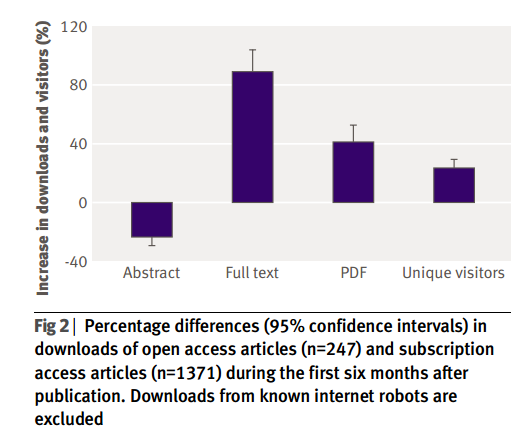In my previous module, there was a lot of research to be done to construct our essays and as I tried to access articles and studies I realised few were free to access and most were behind paywalls. I found it quite frustrating and imagined how it would be if paywalls didn’t exist which is quite contrary to the likely future. (The Drum, 2016)
But what would it mean for content producers to make their stuff free to access? What are the advantages and disadvantages of doing so? I decided to explore this issue through the academic realm.

The following video explores the concept of open access in the realm of academic articles and research:
We can see that Digitization and increase in journal prices are two major changes that have influenced the sharing of academic work around the world.
Let’s talk about advantages of open access.
Scientists and academics that are not well established and those who are limited financially can benefit from the reach and exposure open access journals can provide simply through the amount of individuals accessing it.
The graph below which is part of a study shows that full text downloads, pdf downloads and unique visitors were substantially higher than for subscription articles. (Open Science, 2016)
 Source: http://openscience.com/open-access-increases-citation-a-brief-overview-of-two-reports/
Source: http://openscience.com/open-access-increases-citation-a-brief-overview-of-two-reports/
Let’s talk about cost. We’re not just talking about post acceptance fees that are considerably lower than traditional journals but also subscription fees as the absence of it is contrary to the prohibitive high priced subscription fees of traditional journals. (Aje.com, 2016)
Furthermore, the ease and low cost of access to academic material enable further contribution and development to be carried out by other academics. It also enables the general public and educators to access information and improve education across the globe. (Forbes.com, 2016)
Source: Created by me
What about Disadvantages?
Prestige is an important factor for researchers to build credibility through publishing. However, open access journals are not known to have a high impact factor or it would take considerable time to credibility. (Openaccess.nl, 2016)
Issues such as plagiarism or misrepresentation are also disadvantages of producing content freely through open access. Higher hits on your research does not necessarily mean a higher citation rate. (Aje.com, 2016)
Researchers effectively also cannot expect immediate payment but rather will have to depend on the long term benefits of finding opportunities through publishing material through open access journals.
Although I have focused my thoughts on the academic realm of producing content, the issues described above are quite relevant also in terms of entertainment through media online. Famous YouTubers have started off creating content for free and end up building a social presence that attracts big deals from big companies and other financial opportunities. But online content producers also face problems with copyright and stealing of intellectual property.
References:
The Drum. (2016). 90% of online content to be held behind paywalls in three years media company survey suggests. [online] Available at: http://www.thedrum.com/news/2013/04/12/90-online-content-be-held-behind-paywalls-three-years-media-company-survey-suggests [Accessed 15 Nov. 2016].
Aje.com. (2016). Making the Choice: Open Access vs. Traditional Journals | AJE | American Journal Experts. [online] Available at: http://www.aje.com/en/arc/making-the-choice-open-access-vs-traditional-journals/ [Accessed 15 Nov. 2016].
Open Science. (2016). Open Access increases citation? A brief overview of two reports. [online] Available at: http://openscience.com/open-access-increases-citation-a-brief-overview-of-two-reports/ [Accessed 15 Nov. 2016].
Forbes.com. (2016). Forbes Welcome. [online] Available at: http://www.forbes.com/sites/skollworldforum/2013/04/07/education-finally-ripe-for-radical-innovation-by-social-entrepreneurs/#3c64d5497a55 [Accessed 15 Nov. 2016].
Openaccess.nl. (2016). Pros and cons. [online] Available at: http://www.openaccess.nl/en/what-is-open-access/pros-and-cons [Accessed 15 Nov. 2016].
Hello Issac, as you have mentioned in your post, the issue of open access is not limited to scholarly articles. It is applicable to digital media as well. One of the key concern regarding media contents is piracy. I feel that as long as there are paywalls withholding these contents from consumers, there will always be piracy. The solution in my opinion, is to make these content freely accessible to consumers. Charging only for the use of these contents. The revenue will mainly derive from advertisement embedded into the media contents. Profits and revenue will not drop as the contents are freely, easily, and legally accessible compared to the pirated versions, people will shift towards these legitimate contents. Thus, creating a larger market for advertising.
Do you think this model will work? How else do you think we should combat the issue of piracy?
LikeLiked by 1 person
Hey Jeremiah,
Thank you for leaving a comment!
Yes, i absolutely agree with you that piracy is a huge issue in the digital world be it music, games or movies.
You speak of charging only for the use of the contents but i presume this would only work with applications that are used online and streaming services.
On the other hand, in the case of downloadable games/software, there has been advances in piracy protection by integrating software that prevents cracking of the game or application.
Advertisements are definitely a plausible source of revenue but there is always the question of payment for the value of the product or content itself. Software developers are going to need substantial financial support for the betterment of their product and advertisement revenue alone may not be able to accomplish that.
I feel the battle against piracy may be an ongoing one as developers figure out new ways to prevent the cracking of their software and music artists figure out how to limit their distribution of music through reputed and established streaming or music services such as Spotify or apple music.
LikeLike
Hey Isaac,
I get what you mean! I get frustrated whenever I am one step away from the content I am looking for, but a paywall stands in between or only limited access is granted and I only have access to the abstract of the full document.
Of course, as an end user, I am all for open access!That’s free access to information online, convenience and less expenditure to access the necessary content needed. Seems like all to gain and very little to lose on the user’s end, except for the legitimacy hurdle that we have to jump across.
On the other hand, as a content producer, there are trade-offs involved (i.e. costs, prestige, reach of content). Albeit, there are several occasions where a YouTube sensation or blogger can turn celebrity overnight because of a single content posted freely through open access. Having thought through the trade-offs, would you stay on the safe side and publish your content behind paywalls or jump into the deep ocean of open access?
LikeLiked by 1 person
Hey Joletta,
thank you for your feedback and that is a very good question!
i feel that if i were a content producer in the digital world, i would use both systems of paywalls and open access.
Open access could help me maximize my visibility and social presence in the initial stages of my online career and may also lead me to different opportunities.
Once i have established myself i could take advantage of the paywall system in order to more effectively finance my work. This will enable me to attract not just as much attention as possible but also the right kind of attention effectively motivating me to improve the quality of my content.
Cheers!
LikeLike
Hi Isaac,
Your opening totally cracked me up! For this very reason, as a student myself, I appreciate having open access to academic journals online. Your post has concisely explained the advantages and disadvantages of content producers publishing their material online freely in an academic context.
However, there were some disadvantages that you did not discuss, which I would like to add on in your context of open access in the academic realm. The first disadvantage is the lack of quality control in open access sites for academic journals. Journals published might be incentivized, and new open access journals often don’t have the same established reputation as traditional print journals. (Geib, 2013)
Another disadvantage that applies to generally all open source content is that it increases competition among content producers to churn out content which may not necessarily be of quality. Having mentioned this, do you think that these disadvantages raise an ethical issue where content producers are misusing open access as a loophole for personal gains?
References:
Geib, A. (2013) Advantages and disadvantages of open access. Available at: https://www.edanzediting.com/blogs/advantages-and-disadvantages-of-open-access (Accessed: 16 November 2016).
LikeLiked by 1 person
Hey Shafiq,
Thank you for stopping by and leaving a comment!
Yes, i agree the issues of lack of quality control and prestige are important ones to be considered.
However if you think about it, even if the open access system might allow content producers to deliver low quality content in the process of competition, it does not guarantee that they benefit from this kind of production.
For example, academics might get a lot of hits on their articles but that does not necessarily translate into citation and references. If customers/viewers do not find value in the content they can always just go to another source in an open access system.
At the end of the day it will definitely be an ethical problem that both creators and public will have to deal with.
LikeLike